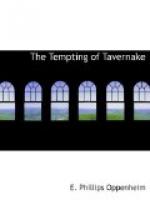“You don’t understand—you can’t,” he went on, “but there it is. I never spoke to a woman until I spoke to Beatrice. Chance made me her friend. I began to understand the outside of some of those things which I had never even dreamed of before. She set me right in many ways. I began to read, think, absorb little bits of the real world. It was all wonderful. Then Elizabeth came. I met her, too, by accident—she came to my office for a house—Elizabeth!”
Pritchard found something almost pathetic in the sudden dropping of Tavernake’s voice, the softening of his face.
“I don’t know how to talk about these things,” Tavernake said, simply. “There’s a literature that’s reached from before the Bible to now, full of nothing else. It’s all as old as the hills. I suppose I am about the only sane man in this city who knew nothing of it; but I did know nothing of it, and she was the first woman. Now you understand. I can’t hear a word against her—I won’t! She may be what you say. If so, she’s got to tell me so herself!”
“You mean that you are going to believe any story she likes to put up?”
“I mean that I am going to her,” Tavernake answered, “and I have no idea in the world what will happen—whether I shall believe her or not. I can see what you think of me,” he went on, becoming a little more himself as the stress of unaccustomed speech passed him by. “I will tell you something that will show you that I realize a good deal. I know the difference between Beatrice and Elizabeth. Less than a week ago, I asked Beatrice to marry me. It was the only way I could think of, the only way I could kill the fever.”
“And Beatrice?” Pritchard asked, curiously.
“She wouldn’t,” Tavernake replied. “After all, why should she? I have my way to make yet. I can’t expect others to believe in me as I believe in myself. She was kind but she wouldn’t.”
Pritchard lit a cigar.
“Look here, Tavernake,” he said, “you are a young man, you’ve got your life before you and life’s a biggish thing. Empty out those romantic thoughts of yours, roll up your shirt sleeves and get at it. You are not one of these weaklings that need a woman’s whispers in their ears to spur them on. You can work without that. It’s only a chapter in your life—the passing of these three people. A few months ago, you knew nothing of them. Let them go. Get back to where you were.”
Then Tavernake for the first time laughed—a laugh that sounded even natural.
“Have you ever found a man who could do that?” he asked. “The candle gives a good light sometimes, but you’ll never think it the finest illumination in the world when you’ve seen the sun. Never mind me, Pritchard. I’m going to do my best still, but there’s one thing that nothing will alter. I am going to make that woman tell me her story, I am going to listen to the way she tells it to me. You think that where women are concerned I am a fool. I am, but there is one great boon which has been vouchsafed to fools—they can tell the true from the false. Some sort of instinct, I suppose. Elizabeth shall tell me her story and I shall know, when she tells it, whether she is what you say or what she has seemed to me.”




